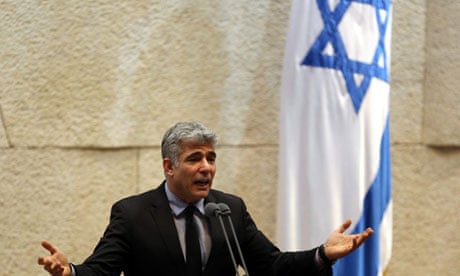Everybody knows that religious fundamentalists are part of the Middle East's problem. Everybody knows that Muslim and Jewish extremists make a hard situation harder, delaying the day Palestinians and Israelis find a way to live in peace. Everybody knows that the great Israeli writer Amos Oz is right when he says that so long as the conflict is "a battle over real estate" it can be solved, but once it becomes a holy war only catastrophe beckons.
But what if that conventional wisdom is wrong – or rather, what if it lumps together all religious hardliners too crudely, mistakenly including one group that might not be part of the problem at all, that might in fact be the key to the solution?
The question arises because of one unexpected side-effect of Israel's most recent elections and the new coalition that followed. For the first time in years the ultra-orthodox Jewish parties find themselves in opposition, sitting alongside Labour, the civil rights activists of Meretz and the 11 members of the mainly Arab parties, representing Israel's Palestinian citizens. So long inside successive ruling coalitions, the ultra-orthodox, or haredi, parties are, for now at least, outsiders. That simple fact suggests an intriguing possibility.
First, though, a word or two of definition. There are two parties involved: one, United Torah Judaism, that aims to speak for Ashkenazi religious Jews and whose leaders still wear the distinctive garb of eastern European orthodoxy; and the other, Shas, that seeks to represent those Jews with a Middle Eastern or north African background. Different though they are from each other, the relevant gap is between them and the so-called "national religious camp", whose political arm, Naftali Bennett's Jewish Home party, surged at the last elections straight into government. Bennett is the champion of, among others, the religiously motivated Jewish settlers on the West Bank, those whose faith is inseparable from a muscular brand of nationalism.
For years, these two camps – ultra-orthodox and national religious – co-existed happily, their leaders often sitting side by side in coalition. The distinction between them became ever harder to discern, the haredi parties acquiescing without complaint in the steady rightward drift of the last government.
But that long-established alliance is now over. While the national religious camp enjoys the best seats around the cabinet table, its former partners are outside, experiencing the unfamiliar chill of opposition. What's more, the two groups are now at each other's throats.
For the glue that binds together Binyamin Netanyahu's new coalition is a willingness to confront the ultra-orthodox, insisting that they have been feather-bedded for too long, taking too much from the state and giving too little in return. That's the signature message of Yair Lapid, the TV talkshow host who emerged as the election's big winner and coalition kingmaker. The price of his support was Netanyahu backing Lapid's campaign promise "to share the burden" – code for demanding that the haredim, like everyone else, send their children to join the army or do some form of national service at 18, ending an exemption enjoyed by religious students since the founding of the state. No less threatening to the haredi way of life, Lapid is bent on slashing the fat state subsidies that have long funded ultra-orthodox schools and academies, as well as the haredim's traditionally large families. Now in place as finance minister, Lapid is already wielding his knife.
These twin assaults are devastating for the haredim, whose fury is directed at Lapid but even more hotly at Bennett – who they see as a traitor to his fellow religious Jews for participating in a coalition that imperils their way of life. Suddenly the ideological fissure that always existed between the haredi brand of orthodoxy and the nationalist variety has been pulled wide open, left gaping for all to see. And it's not pretty. Stung by the rejection of their former allies, the haredim have hit the national religious camp where it hurts – threatening to back a settlement freeze, even to boycott settlement produce.
This is the opening that all those who yearn for an end to occupation should be watching closely. It may not look like it, but this is more than a family feud among those who wear different varieties of skullcap. The hard arithmetic of Israeli politics is that the strictly religious parties regularly command close to 20 of the Knesset's 120 seats. That makes them a crucial, even decisive bloc in the formation of a coalition. If the votes of the centre-left and right blocs are deadlocked, as they often are, then it can fall to the haredim to decide who governs – those forces ready to do what needs to be done to implement a two-state solution, or those who refuse.
It's not foolish to think that the haredim could one day choose left over right. Theologically, it makes sense. Ultra-orthodox Jews were historically ambivalent, if not outright hostile, towards Zionism itself, many regarding it as a blasphemous pre-emption of God's will for Jews to organise their own return to Zion when "the ingathering of the exiles" was the sole mandate of the Almighty. Given that attitude to Israel proper, they have no great attachment to the settlement project. Plenty of rabbinic sages have indeed ruled that, if a genuine peace were on offer, Israelis would have a religious duty to give up territory – because even the holiest land is not holier than the sanctity of life. Besides, strict Judaism includes the injunction lo lehitgarot ba-umota, a prohibition against "taunting the non-Jewish nations", pursuing a course that antagonises the world – which the post-1967 occupation so clearly does.
The pragmatic truth is that if a dove-ish Israeli government, even one committed to ending the occupation, were to give the haredim what they want – military exemption and serious funding – the ultra-religious parties would be likely to give it their blessing. That may be hard for the Israeli left to swallow. "Liberal Israel has to make its choice," says Daniel Levy, who runs the Middle East programme for the European Council on Foreign Relations. "What's more important: having the haredim serve in the army or a two-state solution?"
But this is not a matter for the left in Israel alone. There's a role here for the rest of the world. When Bill Clinton was overseeing the ultimately successful peace process for Northern Ireland, he went through a spell of seeing everyone, even the tiniest loyalist splinter group would get a face-to-face meeting in the Oval Office. He knew that every vote would count. Barack Obama and John Kerry – and William Hague for that matter – should take note. Don't just meet the leaders of today's Israeli government, meet the men and women who could form the next one – including the religious fundamentalists who might just hold the key to peace.

